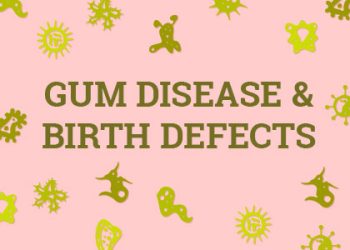Can Gum Disease Cause Birth Defects?
 What is Gum Disease?
What is Gum Disease?
The short answer: gum disease is a common gum infection that can become very problematic, but you can prevent it! The long answer: all the tissues in your body have a self-defense mechanism called “inflammation.” When bacteria build up in your mouth, your gum tissue will inflame to try and kill it. Gum inflammation is called gingivitis and looks like red, soft, and sore gum tissue.
Over time, gingivitis can lead to more troublesome gum disease (called periodontitis) that can grow even deeper and start to harm the bones of your teeth and jaw. Severe gum disease can wreak havoc in your mouth. Pregnant women need to be especially careful because gum disease is linked with pre-term births and babies with low birth weight.
Every mom and mom-to-be wants the best start for their baby on their journey into parenthood. Read on to learn more from Dr. Mack & Dr. Wachter of Family Dentistry of Bellevue, about gum disease and pregnancy.
Gum Disease, Pregnancy, and Birth Defects
Here are the facts:
- Up to 75% of pregnant women get gingivitis. About 50% of those women will see it worsen during pregnancy.
- Hormonal changes and diabetes – conditions common to pregnancy – can increase the risk of gum disease.
- Studies show higher maternal age and lower socioeconomic status are both risk factors for gum disease during pregnancy.
- Though we don’t yet fully understand the reasons, gum disease is proven to increase your risk of preterm birth and having a baby with low birth weight.
Why is this important?
Babies born weighing less than 5.5 pounds have an increased risk of slower development (physically, socially, and emotionally) for the rest of their lives. Babies born too early can have those same complications as well as problems with their vision, breathing, hearing, and digestion. Talk to your doctor to learn more about preterm birth and low birth weight.
How You Can Prevent Gum Disease
There’s no hall pass for brushing your teeth while pregnant. Preventive oral hygiene (brushing, flossing, professional dental cleanings) is both safe and necessary, especially for pregnant women. Not to mention your pregnancy cravings may have you enjoying an extra sweet treat or two these days – ice cream for breakfast, anyone?
Stay ahead of the game and prevent gum disease by eating tooth-friendly foods and keeping your mouth clean. If gingivitis crops up, don’t hesitate to get a professional cleaning at the dentist. You can also ask for prescription-strength mouthwash if you need the extra help.
Talk to both your primary doctor and your dentist about your overall health, including the state of your gums. If you’re looking for a Bellevue dentist, we’d love to care for you during this special time. Contact Family Dentistry of Bellevue today to make an appointment!
The content on this blog is not intended to be a substitute for professional medical advice, diagnosis, or treatment. Always seek the advice of qualified health providers with questions you may have regarding medical conditions.
| Monday | 7:30 AM - 4:30 PM |
| Tuesday | 7:30 AM - 4:30 PM |
| Wednesday | 7:30 AM - 4:30 PM |
| Thursday | 7:00 AM - 2:00 PM |
| Friday | 7:00 AM - 11:00 AM |